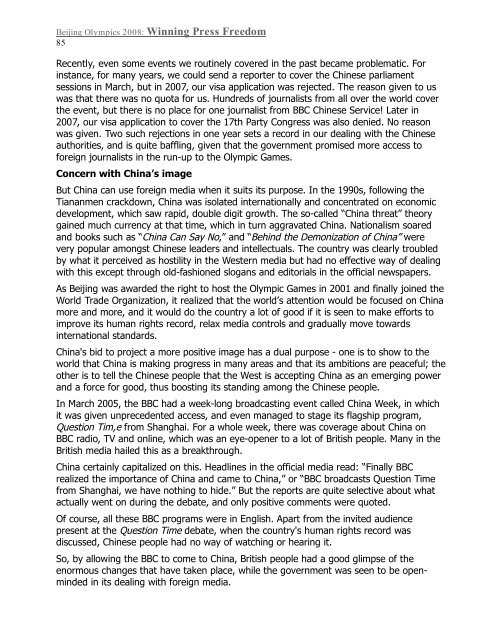Beijing Olympics 2008: Winning Press Freedom - World Press ...
Beijing Olympics 2008: Winning Press Freedom - World Press ...
Beijing Olympics 2008: Winning Press Freedom - World Press ...
Create successful ePaper yourself
Turn your PDF publications into a flip-book with our unique Google optimized e-Paper software.
<strong>Beijing</strong> <strong>Olympics</strong> <strong>2008</strong>: <strong>Winning</strong> <strong>Press</strong> <strong>Freedom</strong><br />
85<br />
Recently, even some events we routinely covered in the past became problematic. For<br />
instance, for many years, we could send a reporter to cover the Chinese parliament<br />
sessions in March, but in 2007, our visa application was rejected. The reason given to us<br />
was that there was no quota for us. Hundreds of journalists from all over the world cover<br />
the event, but there is no place for one journalist from BBC Chinese Service! Later in<br />
2007, our visa application to cover the 17th Party Congress was also denied. No reason<br />
was given. Two such rejections in one year sets a record in our dealing with the Chinese<br />
authorities, and is quite baffling, given that the government promised more access to<br />
foreign journalists in the run-up to the Olympic Games.<br />
Concern with China’s image<br />
But China can use foreign media when it suits its purpose. In the 1990s, following the<br />
Tiananmen crackdown, China was isolated internationally and concentrated on economic<br />
development, which saw rapid, double digit growth. The so-called “China threat” theory<br />
gained much currency at that time, which in turn aggravated China. Nationalism soared<br />
and books such as “China Can Say No,” and “Behind the Demonization of China” were<br />
very popular amongst Chinese leaders and intellectuals. The country was clearly troubled<br />
by what it perceived as hostility in the Western media but had no effective way of dealing<br />
with this except through old-fashioned slogans and editorials in the official newspapers.<br />
As <strong>Beijing</strong> was awarded the right to host the Olympic Games in 2001 and finally joined the<br />
<strong>World</strong> Trade Organization, it realized that the world’s attention would be focused on China<br />
more and more, and it would do the country a lot of good if it is seen to make efforts to<br />
improve its human rights record, relax media controls and gradually move towards<br />
international standards.<br />
China's bid to project a more positive image has a dual purpose - one is to show to the<br />
world that China is making progress in many areas and that its ambitions are peaceful; the<br />
other is to tell the Chinese people that the West is accepting China as an emerging power<br />
and a force for good, thus boosting its standing among the Chinese people.<br />
In March 2005, the BBC had a week-long broadcasting event called China Week, in which<br />
it was given unprecedented access, and even managed to stage its flagship program,<br />
Question Tim,e from Shanghai. For a whole week, there was coverage about China on<br />
BBC radio, TV and online, which was an eye-opener to a lot of British people. Many in the<br />
British media hailed this as a breakthrough.<br />
China certainly capitalized on this. Headlines in the official media read: “Finally BBC<br />
realized the importance of China and came to China,” or “BBC broadcasts Question Time<br />
from Shanghai, we have nothing to hide.” But the reports are quite selective about what<br />
actually went on during the debate, and only positive comments were quoted.<br />
Of course, all these BBC programs were in English. Apart from the invited audience<br />
present at the Question Time debate, when the country's human rights record was<br />
discussed, Chinese people had no way of watching or hearing it.<br />
So, by allowing the BBC to come to China, British people had a good glimpse of the<br />
enormous changes that have taken place, while the government was seen to be openminded<br />
in its dealing with foreign media.





